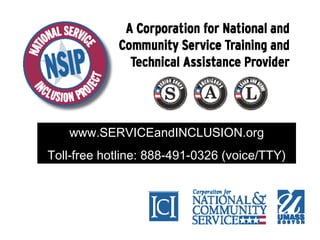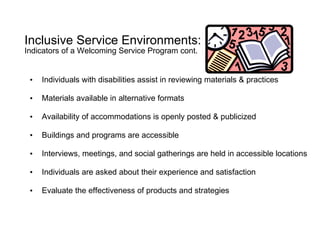disability_inclusion_101
- 1. www.SERVICEandINCLUSION.org Toll-free hotline: 888-491-0326 (voice/TTY)
- 2. Training and Technical Assistance  Values that Guide & Current Best Practices on Inclusion  Person-first Language & Inclusion Etiquette  Who are People with Disabilities?  Who is a "Qualified" Person with a Disability?  To Disclose or Not to Disclose – What is the Impact?  Creating an Environment that Encourages Disclosure  How to Conduct Effective Outreach & Recruitment to People with Disabilities  Interviewing: Welcoming & Appropriate Questions & Statements  Understanding the ADA & Section 504  Beyond the Laws: Creating a Welcoming, Inclusive Environment  Accommodation Strategies & Adaptive Products: No Tech, Low Tech & High Tech  Demonstrations & "hands-on" activities of how to use Accommodation Products  How to develop Inclusive Service Descriptions How to Ensure Access for Everyone: architectural, programmatic, communication, & alternative format access Member & Volunteer Management - supervising & performance concerns Recruitment & Networking Resources: Disability Organizations and Agencies  Preparing for Accessibility Site Visits  Reasonable Accommodations: definition & responsibilities Disability Benefits: Supplemental Security Income & Social Security Disability Income  Supporting Inclusion through Community Asset Mapping Emergency Preparedness for People with Disabilities
- 3. “ Disability” as Defined by Section 504 of the Rehabilitation Act & the Americans with Disabilities Act A physical or mental impairment that substantially limits one or more major life activities A record of such an impairment Being regarded as having such an impairment, even when no limitations exist
- 4. Major life activities include, but are not limited to: caring for oneself, performing manual tasks, walking, seeing, hearing, speaking, breathing, learning, working, sitting, standing, lifting, reaching, sleeping and mental/emotional processes such as thinking, concentrating and interacting with others. “ Major Life Activity” anything an average person can do with little or no difficulty… US EEOC
- 5. Cornell University School of Industrial and Labor Relations Employment and Disability Institute “ Substantially limits” … unable to perform, or significantly limited in the ability to perform, an activity as compared with an average person. Factors to be considered are: its nature and severity how long it will last or is expected to last, and 3. its permanent or long-term impact, or expected impact however…
- 6. “ Qualified Individual” An individual with a disability who, with or without reasonable accommodations, can perform the essential functions of the position. Just like participants without disabilities, the individual must meet the qualifications the program has in place.
- 7. “ Qualified” Does the individual meet necessary prerequisites for the job, such as: • education • work experience • training • skills • licenses • certificates • other job-related requirements, such as good judgment or ability to work with other people
- 8. An accommodation… is any change in the service environment or in the way things are customarily done that enables an individual with a disability to enjoy equal service opportunities. The U.S. Equal Employment Opportunity Commission, October 17, 2002
- 9. The History of the Disability Movement Living with a Disability: Today
- 10. Language Guidelines “ DISABILITY” - Yes! “ HANDICAP” - No! “ IMPAIRMENT” - No! “ DISABLED” - No! USE “PERSON FIRST” LANGUAGE e.g., “person with a disability” not “the disabled”
- 11. Person First Language and Basic Etiquette The Golden Rule: If you are ever unsure of: acceptable language, acceptable etiquette, or anything else: It is OK to Ask To be unaware and courteous is understandable, and often invited To make assumptions is often unacceptable
- 12. Basic Disability Etiquette Offering assistance Okay to offer Ask first Clarify assistance desired Preferences are different Accept no Always direct communication to the person with a disability Unsure what to do? Ask! Make a mistake? Apologize, correct, learn and move on Treat adults as adults Relax!
- 13. Language Guidelines Examples of terms to avoid and why: Afflicted Cripple Handicapped Idiot Imbecile Mongoloid Wheelchair bound If you’re unsure of the proper term, or language, to use, ask!
- 14. Don’t lean on or touch a person's wheelchair, cane or crutches. These products are part of the space that belongs to the person who uses it. Use a chair, whenever possible, in order to place yourself at the person's eye level to facilitate conversation. People with limited hand use or who wear a prosthetic limb can usually shake hands. Shaking hands with the left hand is acceptable. To get the attention of a person with a hearing disability, tap the person on the shoulder or wave your hand. Look directly at the person and speak clearly, naturally and slowly to establish if the person can read lips. Face a good light source and keep your hands away from your mouth when speaking. Do not pretend to understand what a person is saying if you do not. Try rephrasing what you wish to communicate, or ask the person to repeat what you do not understand. When greeting a person with a severe loss of vision, always identify yourself and others who may be with you. When conversing in a group, give a vocal cue by announcing your name and the name of the person to whom you are speaking.
- 15. Service Animal is any guide dog, signal dog, or other animal individually trained to provide assistance to an individual with a disability regardless of whether they have been licensed or certified by a state or local government. Do not touch or pet the Service Animal, without permission. Do not make noises at the Service Animal, it may distract the animal from doing it’s job. Do not feed the Service Animal, it may disrupt his/her schedule. The person may not feel like discussing the assistance the Service Animal provides.
- 16. Indicators of a Welcoming Service Program Individuals with disabilities are full participants in program and service activities Individuals with disabilities are treated as peers Expectations for individuals with disabilities are the same as for others “ Qualified individuals with disabilities and those from diverse backgrounds are strongly encouraged to apply. We provide reasonable accommodations for qualified individuals and conduct all activities in fully accessible settings.” Questions and solutions naturally arise about accessibility when planning activities Products and interior decorations portray images of people with disabilities
- 17. Inclusive Service Environments: Indicators of a Welcoming Service Program cont. Individuals with disabilities assist in reviewing materials & practices Materials available in alternative formats Availability of accommodations is openly posted & publicized Buildings and programs are accessible Interviews, meetings, and social gatherings are held in accessible locations Individuals are asked about their experience and satisfaction Evaluate the effectiveness of products and strategies
- 18. When are Individuals with Disabilities Full Participants in All Program and Service Activities? When they are they treated as peers. When expectations for individuals with disabilities are the same as for everyone. When they assist in the development and review of materials and practices. When they are asked about their experiences and satisfaction… and their input is carefully assessed.
- 19. Domestic Volunteer Service Act and National & Community Service Act An individual with responsibility for the operation of program/project that receives assistance under this Act/subchapter shall not discriminate against a participant in, or member of the staff of, such program on the basis of… disability, if the participants or member is a qualified individual with a disability.
- 20. Section 504 & ADA Intent Ensure non-discrimination against people with disability Ensure equal access and opportunity
- 21. Section 504 of the Rehablitation Act of 1973 “ No otherwise qualified disabled individual in the United States… shall, solely by reason of his or her disability, be excluded from participation in, be denied the benefits of, or be subjected to discrimination under any program or activity receiving Federal financial assistance.”
- 22. CNCS Complaint Process Any service member with a disability, who believes he or she has been discriminated against in violation of Section 504 of the Rehabilitation Act*, may raise his or her concerns with our Office of Civil Rights and Inclusiveness (OCRI). *Section 504 states that no individual with a disability can be excluded from, denied benefits of, and subjected to discrimination to any program or activity that receives federal funds because of his/her disability. Contact Information: Corporation of National and Community Service Office of Civil Rights and Inclusiveness Phone: (202) 606-7503(voice) (202) 565-2799 (TDD) Email: eo@cns.gov Website: http://www.nationalservice.gov/home/no_fear_act/index.asp Important Note: 1. Service members must file discrimination claims with the OCRI Office within 45 days of when it occurred, otherwise it may not be accepted in a formal complaint of discrimination. 2.The OCRI office is committed to resolving the complaint promptly. Additionally, the OCRI office encourages but does not require service members to bring their concerns to program or project directors first.






















